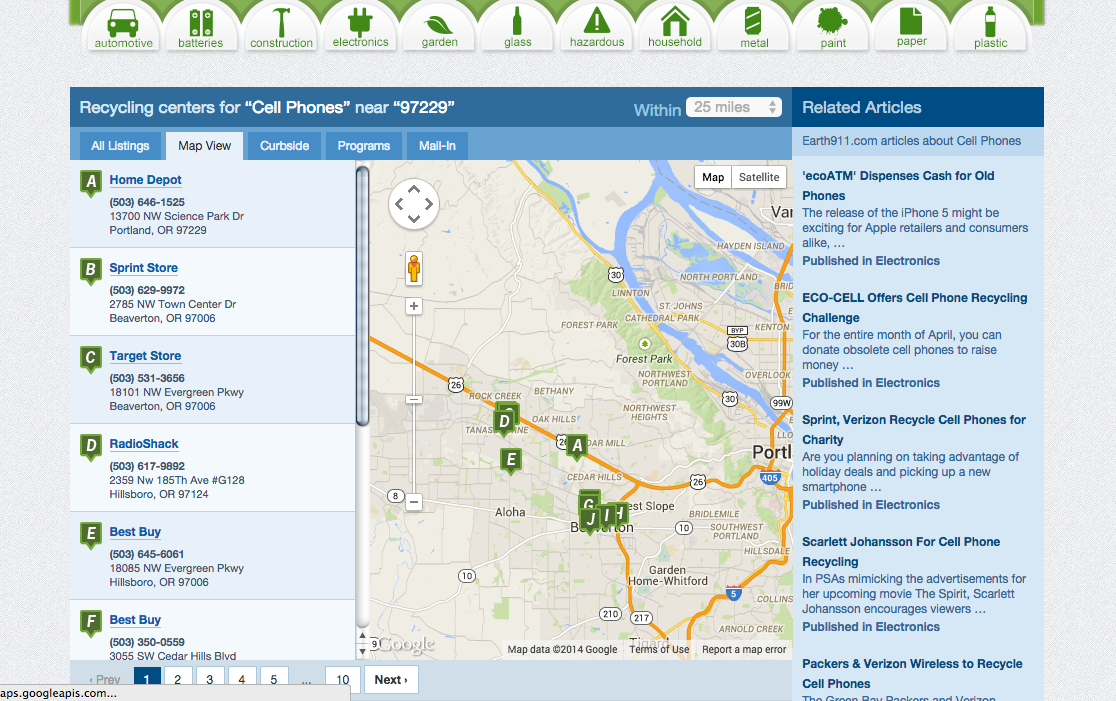The "In's" and "Out's" of E-Cycling
A common problem that comes about is what exactly should we do after our devices kick the bucket? There's probably a lot of these still sitting around your house not knowing what to do with them, maybe you're concerned about your personal information resurfacing after being discarded, or perhaps just the lack of proper information on how to dispose or your cell phones, computers, and electronic materials. Luckily, this is not as difficult as it sounds to get rid of your expired devices in a safe, secure, and efficient way.
Much of the world's electronic waste is not actually recycled but rather completely disregarded and thrown away carelessly.
This is exceedingly helpful to know when that day comes when a phone, computer, television, monitor, you name it, decides to cross the great divide.
Look at these great tips before you go and donate or recycle your machine.
Firstly,
http://www.epa.gov/epawaste/conserve/materials/ecycling/donate.htm
Or if you can't find what you are looking for, these sites will take you to some suitable locations
http://www.call2recycle.org/locator/ (this site is for mainly batteries)
http://search.earth911.com/ (search places to recycle anything imaginable!)
http://www.ecyclingcentral.com/ (provides a source for e-cycling events near you)
http://greenergadgets.org/ (this has a really cool energy calculator to show you your electronic use)
I was able to find plenty of convenient locations on Earth 911 to recycle some old cell phones I've been holding on to for a while.
E-cycling doesn't just help free up some clutter at home but there are some great environmental and social benefits for the community!
http://www.epa.gov/epawaste/conserve/materials/ecycling/faq.htm#howmuch
Much of the world's electronic waste is not actually recycled but rather completely disregarded and thrown away carelessly.
"A great deal of what is labeled as “e-waste” is actually not waste at all; rather, it is whole electronic equipment or parts that are readily marketable for reuse or can be recycled for materials recovery. In 2009, approximately 25 percent of TVs, computer products, and cell phones that were ready for end-of-life management were collected for recycling. Cell phones were recycled at a rate of approximately 8 percent" (US EPA).The United States Environmental Protection Agency has provided an excellent source for people to gain knowledge and locate accepted settings to dispose of products.
This is exceedingly helpful to know when that day comes when a phone, computer, television, monitor, you name it, decides to cross the great divide.
Look at these great tips before you go and donate or recycle your machine.
Firstly,
- For your computer or laptop, consider upgrading the hardware or software instead of buying a brand new product.
- Delete all personal information from your electronics.
- Remove any batteries from your electronics, they may need to be recycled separately.
http://www.epa.gov/epawaste/conserve/materials/ecycling/donate.htm
Or if you can't find what you are looking for, these sites will take you to some suitable locations
http://www.call2recycle.org/locator/ (this site is for mainly batteries)
http://search.earth911.com/ (search places to recycle anything imaginable!)
http://www.ecyclingcentral.com/ (provides a source for e-cycling events near you)
http://greenergadgets.org/ (this has a really cool energy calculator to show you your electronic use)
I was able to find plenty of convenient locations on Earth 911 to recycle some old cell phones I've been holding on to for a while.
E-cycling doesn't just help free up some clutter at home but there are some great environmental and social benefits for the community!
"Recycling your cell phone helps protect the environment in a number of ways. Cell phones are made from valuable resources such as precious metals, copper, and plastics—all of which require energy to mine and process. Recovering these materials by recycling avoids the need to mine and process new materials, which in turn, conserves our natural resources, and avoids air and water pollution and greenhouse gas emissions. For example, we would save the energy equivalent to the electricity used by more than 24,000 US homes in a year.
Cell phones have a number of different metals in them which can be recycled. For every million cell phones we recycle, 35,274 pounds of copper, 772 pounds of silver, 75 pounds of gold, and 33 pounds of palladium can be recovered. Recovering metals from used cell phones can reduce extraction of raw metals from the earth" (US EPA).
"If the cell phone and its accessories are in good working condition, some collection programs donate them to a number of worthy charities or provide them for sale to those who need them. In addition, many reuse and recycling programs use the proceeds of their programs to benefit charitable organizations, such as domestic violence, environmental causes, children’s safety, etc. Other recycling programs work with schools and other organizations to collect cell phones as fundraising ventures. The principal markets for refurbished cell phones extend beyond the US—availing access to modern communication technology to many people in developing economies with who would not otherwise be able to afford it" (US EPA).Take some time to check out the US Environmental Protection Agency website and learn how you can help the community and environment, and at the same time get rid all your unused and inoperative devices!
http://www.epa.gov/epawaste/conserve/materials/ecycling/faq.htm#howmuch


Comments
Post a Comment
Let your knowledge, ideas, and innovation be heard. Tell us what you think and know about this topic.